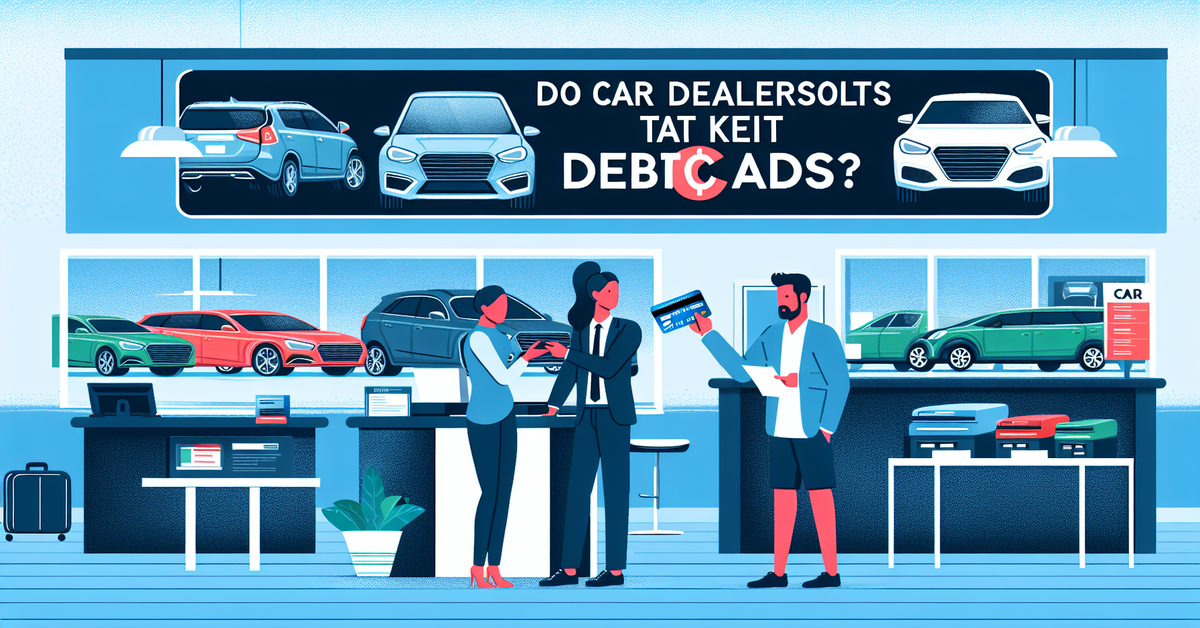When you're considering purchasing a car, you might wonder if dealerships accept debit cards as a payment method. While many do, their policies can vary widely, and it's not always straightforward. Some dealerships may have limits on transaction amounts or additional fees for using a debit card. Understanding these nuances can save you from unexpected complications during your transaction. But what should you know about these policies before you step onto the lot? The answers might surprise you.
Understanding Debit Card Acceptance
While many car dealerships may accept debit cards, it's crucial to understand the limitations and conditions that often accompany such transactions. For starters, dealerships might impose daily spending limits that could restrict your ability to complete a large purchase. Additionally, some dealerships require a minimum deposit that can be higher than what you're willing to pay upfront. You should also verify if they charge any fees for using a debit card, which could add unexpected costs to your purchase. Moreover, using a debit card means that funds are immediately withdrawn from your account, leaving less room for financial flexibility. Consequently, before making any decisions, consider these factors carefully to guarantee you're making a safe and informed choice.
Benefits of Using Debit Cards
Using a debit card for your car purchase can offer several advantages, including immediate payment confirmation and the ability to stick to your budget without incurring debt. By opting for a debit card, you're not only securing your financial safety but also enjoying a streamlined purchasing process.
| Benefit | Description | Emotional Impact |
|---|---|---|
| Immediate Payment | Funds are deducted instantly, ensuring no delays. | Peace of mind with quick closure. |
| Budget Control | Limits spending to available funds, preventing overspending. | Confidence in financial decisions. |
| Low Fees | Minimal transaction fees compared to credit cards. | Relief from additional costs. |
| No Interest Charges | Pay upfront, avoiding future financial burdens. | Freedom from debt worries. |
Choosing a debit card is a smart, secure way to manage your car-buying experience.
Common Limitations on Transactions
Many car dealerships impose common limitations on debit card transactions that can affect your purchasing power and overall experience. For instance, many dealerships cap the maximum amount you can charge, often restricting it to a few thousand dollars. This limitation can hinder your ability to make a full payment if you're buying a higher-priced vehicle. Additionally, some dealerships may require that the funds be available in your account before processing the transaction, adding an extra layer of scrutiny. These restrictions aren't just inconveniences; they can also create stress during a significant purchase. Understanding these limitations is essential for ensuring a smooth transaction and protecting your financial safety. Always inquire about these policies beforehand to avoid unpleasant surprises.
Fees Associated With Debit Payments
Fees tied to debit payments can greatly impact the overall cost of your vehicle purchase, so it's crucial to understand how they apply at car dealerships. While using a debit card seems convenient, you should be aware of potential fees that could arise. These charges may include:
- Transaction Fees: Some dealerships impose a fee for processing debit transactions.
- Flat Fees: A fixed charge for using a debit card, regardless of the purchase amount.
- Percentage Fees: A percentage of the transaction total that goes directly to the dealership.
- ATM Fees: If you withdraw cash to pay, you might incur ATM fees.
Being informed can help you avoid unexpected expenses and guarantee a safer transaction.
Alternatives to Debit Card Payments
While debit cards offer a convenient payment method, considering alternatives can provide added benefits, such as enhanced security and potential rewards. Credit cards, for instance, not only offer fraud protection but also the opportunity to earn points or cash back, which can be particularly advantageous for large purchases like a vehicle. Additionally, bank wire transfers are a secure option that minimizes the risk of fraud, ensuring your funds are transferred directly and safely. Finally, personal checks can provide a paper trail, allowing for better tracking of your payment. By exploring these alternatives, you can enhance your financial safety while enjoying the added perks that come with different payment options.
Tips for Using Debit Cards
When using a debit card for a significant purchase like a car, it's crucial to guarantee you fully understand your card's limits and any potential holds that the dealership might place on your funds. To promote a smooth transaction, consider these tips:
- Check your balance: Make sure you have sufficient funds to cover the purchase and any additional fees.
- Know the limits: Be aware of your card's daily transaction limit to avoid issues at the dealership.
- Notify your bank: Inform your bank about the transaction to prevent any fraud alerts.
- Read the fine print: Understand any potential holds the dealership may impose.
Dealership Policies on Payment Methods
Understanding dealership policies on payment methods is vital, as each dealership may have different rules regarding the acceptance of debit cards and other forms of payment. Some dealerships might accept debit cards for down payments but limit the amount you can charge. Others might prefer bank transfers or certified checks for higher purchases to guarantee security. It's important to clarify these policies before visiting the dealership, as this can prevent misunderstandings and streamline your buying experience. Always ask about any fees associated with using a debit card, as these can vary. By being informed about these policies, you not only protect your financial interests but also facilitate a smoother transaction process, giving you peace of mind during your car purchase.
Factors Influencing Payment Options
Dealerships' acceptance of debit cards and other payment methods often hinges on various factors, including transaction security, buyer preferences, and the total purchase amount. Understanding these influences can help you make informed choices.
- Transaction limits: Many dealerships impose limits on debit transactions to mitigate fraud risks.
- Security measures: Enhanced security protocols may discourage debit card use.
- Fees involved: Processing fees can affect a dealership's willingness to accept debit cards.
- Buyer preference: Your payment method can influence negotiations and financing options.

